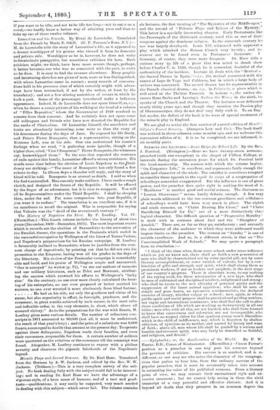Lamartine and his Friends. By Henri de Lacretelle. Translated from
the French by Maria E. Odell. (G. P. Putnam's Sons, N.Y.)- M. de Lacretelle tells the story of Lamartine's life, as it appeared to a devout worshipper of his genius who viewed it from its domestic and private side. Worshipper as he is, however, he does not write indiscriminate panegyrics, but sometimes criticises his hero. Such criticism might, we think, have been more severe, though, perhaps, it better becomes one who was so connected with the poet, to write as he does. It is easy to find the censure elsewhere. Many graphic and interesting sketches are given of men, more or less distinguished, with whom Lamartine came in contact ; many records of conversa- tions held in his presence (one of which certainly might with advan- tage have been retrenched, if not by the writer, at least by the translator) ; and not a few stirring narratives of events in which be took a part. Some of the personages introduced make a ludicrous appearance. Indeed, M. de Lacretello does not spare himself, as, e.g., when he draws a comic picture of his walking at the head of a column of "Filler Repenties," whom the Government of 1848 resolved to remove from their convent. And he certainly does not spare some old colleagues and friends who have now deserted the Republic for the ranks of Clericalism. Of Lamartine himself, the anecdotes and traits are abundantly interesting, none more so than the story of his demeanour during the days of June. He exposed his life freely, and Prince Pierre Bonaparte, then a representative, sitting on the Extreme Left, was at his side. One can understand his cousin's feelings when we read, " A gathering more ignoble, though of a higher class, cried, 'Viva l'Empereur !' Pierre Bonaparte, the witnesses say, horsewhipped them." To the vote that repealed the sentence of exile against this family, Lamartine offered a strong resistance. His words some time before the election of Louis Napoleon to the.Presi- dency are striking,—" The name of Bonaparte has only found a few echoes to-day. In fifteen days a thunder will reply, and the story of blood will be told. Bonaparte is as eternal as death. I said so when the fool was recalled. Man can only make outlines. I have made a rough sketch, and designed the fresco of the Republic. It will be effaced by the finger of an adventurer, but it is soon to reappear. You will all be Representatives under the Third Republic. I shall be sleeping then, under the sod. Put some compassion into your Republic, if you want it to endure." The translation is an excellent one, if it is an excellence to recall the original. Who is responsible for saying that Voltaire was the " devil of the seventeenth century ?"


































 Previous page
Previous page